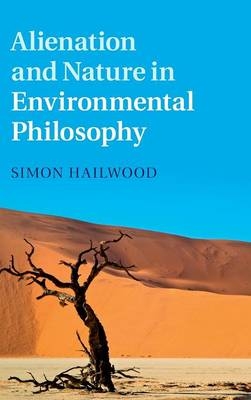
Alienation and Nature in Environmental Philosophy
Seiten
2015
Cambridge University Press (Verlag)
978-1-107-08196-3 (ISBN)
Cambridge University Press (Verlag)
978-1-107-08196-3 (ISBN)
Is it possible to understand the idea of alienation from nature without recourse to excessive romanticism or mythologising? This book tackles this key question in environmental philosophy, examining it in light of different philosophical traditions. It will be of interest to scholars and advanced students of environmental philosophy and environmental studies.
Many environmental scientists, scholars and activists characterise our situation as one of alienation from nature, but this notion can easily seem meaningless or irrational. In this book, Simon Hailwood critically analyses the idea of alienation from nature and argues that it can be a useful notion when understood pluralistically. He distinguishes different senses of alienation from nature pertaining to different environmental contexts and concerns, and draws upon a range of philosophical and environmental ideas and themes including pragmatism, eco-phenomenology, climate change, ecological justice, Marxism and critical theory. His novel perspective shows that different environmental concerns - both anthropocentric and nonanthropocentric - can dovetail, rather than compete with, each other, and that our alienation from nature need not be something to be regretted or overcome. His book will interest a broad readership in environmental philosophy and ethics, political philosophy, geography and environmental studies.
Many environmental scientists, scholars and activists characterise our situation as one of alienation from nature, but this notion can easily seem meaningless or irrational. In this book, Simon Hailwood critically analyses the idea of alienation from nature and argues that it can be a useful notion when understood pluralistically. He distinguishes different senses of alienation from nature pertaining to different environmental contexts and concerns, and draws upon a range of philosophical and environmental ideas and themes including pragmatism, eco-phenomenology, climate change, ecological justice, Marxism and critical theory. His novel perspective shows that different environmental concerns - both anthropocentric and nonanthropocentric - can dovetail, rather than compete with, each other, and that our alienation from nature need not be something to be regretted or overcome. His book will interest a broad readership in environmental philosophy and ethics, political philosophy, geography and environmental studies.
Simon Hailwood is Senior Lecturer in Philosophy at the University of Liverpool. He is the author of Exploring Nozick: Beyond Anarchy, State and Utopia (1996) and How to Be a Green Liberal: Nature, Value and Liberal Philosophy (2004). He is also Managing Editor of the journal Environmental Values.
1. Introduction; 2. Alienations and natures; 3. Pragmatists and sea squirts; 4. Landscape; 5. Nonhuman nature: estrangement; 6. Nonhuman nature: alienation; 7. Estrangement from the natural world; 8. Entailments and entanglements; 9. Concluding remarks; References; Index.
| Verlagsort | Cambridge |
|---|---|
| Sprache | englisch |
| Maße | 152 x 229 mm |
| Gewicht | 540 g |
| Themenwelt | Geisteswissenschaften ► Philosophie ► Ethik |
| Naturwissenschaften ► Biologie ► Ökologie / Naturschutz | |
| Naturwissenschaften ► Geowissenschaften ► Meteorologie / Klimatologie | |
| Recht / Steuern ► EU / Internationales Recht | |
| Wirtschaft | |
| ISBN-10 | 1-107-08196-3 / 1107081963 |
| ISBN-13 | 978-1-107-08196-3 / 9781107081963 |
| Zustand | Neuware |
| Haben Sie eine Frage zum Produkt? |
Mehr entdecken
aus dem Bereich
aus dem Bereich


